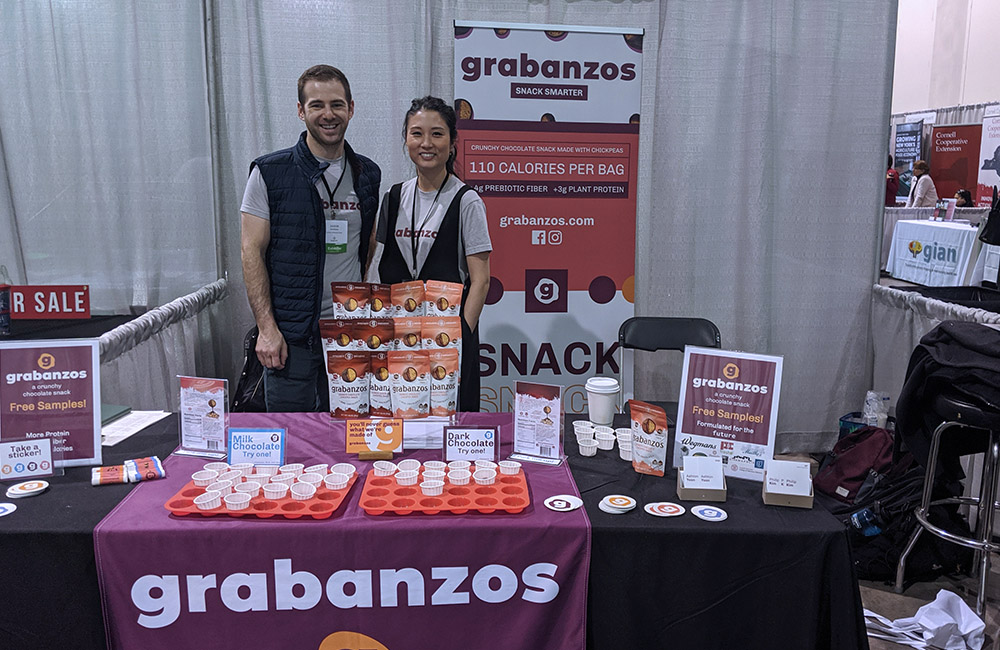
Antithesis Rounds Out a Productive 2020 by Launching Podcast
Antithesis Foods, the Rev member responsible for Grabanzos, everyone’s favorite crunchy chocolate-covered chickpea-based snack, has launched a podcast to explore the food science behind popular snack brands and their “better for you” competitors.
In the first episode of “Better for You,” founders Jason Goodman (CEO) and Ashton Yoon (COO) compare the top selling candy brand in the United States—Reese’s Peanut Butter Cups—and Justin’s Peanut Butter Cups, which has been marketed as a healthier peanut butter cup alternative. Goodman and Yoon are food scientists hailing from Cornell’s Department of Food Science and brand builders, launching Antithesis after participating in eLab (Class of 2018), the university’s student startup accelerator. In 2019, Antithesis received a $225,000 National Science Foundation Small Business Innovation Research Award, which allowed the food science startup to fund an innovative drying technology to scale their novel chickpea-based dough and potentially replace less nutritious commodity ingredients, such as wheat or potatoes, used in crunchy snack foods.
As the pair dive into the history of each product and the particulars of their ingredient lists, it’s clear the two are in their element—even when they don’t agree on which product is healthier overall—which makes for a surprisingly fascinating podcast series.
The pair tackle some contentious food science issues during the podcast. In the first episode, Yoon addresses the topic of palm oil—a controversial ingredient used in many processed foods today.
“Palm oil is a great functional ingredient in foods, because it acts as a stabilizer and an emulsifier. It’s odorless, colorless, semi-solid, and spreadable at room temperature. It has high temperature stability, so you can use it to fry food and get a really nice crisp, and it’s also resistant to oxidation; however, its usage is often looked down on in foods these days because of the massive environmental devastation that can cause habitat destruction and biodiversity loss, especially for orangutangs, hence the ‘orangutang-friendly palm oil seal’ on Justin’s,” said Yoon.
“This is such a complex issue, and it would definitely take more time to discuss than we have here and neither do I pretend to be an expert. I generally think that instead of avoiding an ingredient we should ask ‘How can we do this better?’ Even the World Wildlife Fund states the avoidance of palm oil can actually have even more devastating impacts on the companies and communities that rely on the industry, and it can also force companies to use alternatives in their products that may be just as bad or even worse.”
“Better for You” certainly gives listeners food for thought. The podcast isn’t the only thing Antithesis has been up to in 2020—the company had an eventful year.
In April, the startup participated in the Rabobank-MIT Food & AgTech Innovation Prize, an annual pitch competition for early-stage companies developed by university students, and won second place and $10,000 in funding. Antithesis was also named a finalist in Fuzehub’s 2020 Commercialization Competition, presenting its innovation to a live virtual audience and industry experts.
In the fall, Antithesis partnered with Schuyler County Partnership for Economic Development (SCOPED) and other food and agriculture stakeholders in the region on an agriculture diversification initiative to successfully grow chickpeas in New York State. This project has the potential of shortening the supply chain and decreasing the carbon footprint of the popular legume, which is frequently dehydrated and shipped from the West Coast and then rehydrated by manufacturers on the East Coast.
Additionally, the startup collaborated with RealEats, grand prize winner of the 2019 Grow-NY Food & Ag Competition, to supply Grabanzos as an add-on item to the Geneva, New York company’s healthy home meal deliveries.
“When COVID-19 began, like many other businesses, we had to reevaluate how to get our product to people—all but two or three of our retailers had closed. We thought of meal delivery, as Blue Apron started coming back from the grave. We sent samples to RealEats, who were super kind and added our dark chocolate Grabanzos to their menu. Now they have the highest sales velocity and volume of the retailers that we work with right now, so it’s been absolutely fantastic,” said Yoon.
In addition to RealEats, Grabanzos can be purchased at Wegmans (Ithaca), P&C Fresh (Ithaca), and many other store locations across the state and elsewhere.
If you’re interested in learning more about Antithesis and how they’re trying to disrupt the processed foods space, listen to the second episode of the “Better for You” podcast, in which the founders analyze Flipz Chocolate Covered Pretzels in relation to Grabanzos, their own “better for you” product. So, are Grabanzos the healthier choice? Subscribe and listen to the “Better for You” podcast to find out!
